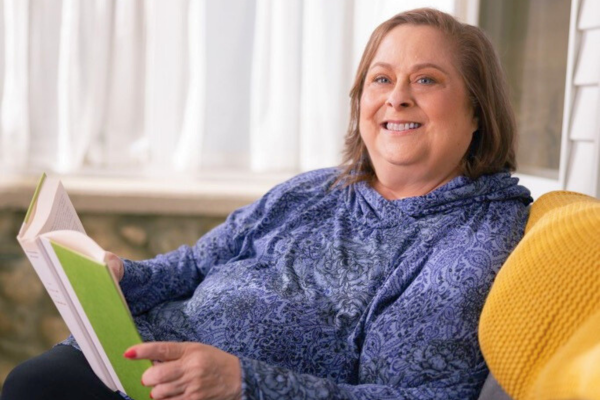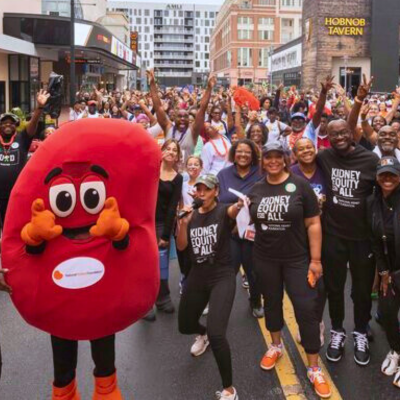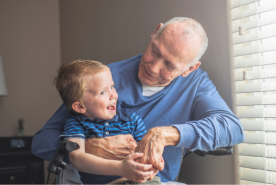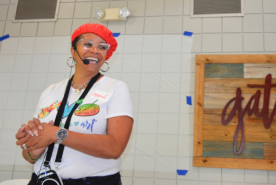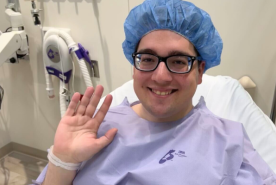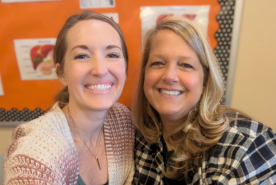November 06, 2025
Maxine’s career spanned 70 countries, but nothing prepared her for life with kidney failure—and what came next.
Maxine’s career spanned 70 countries, but nothing prepared her for life with kidney failure—and what came next.
A Global Health Expert and Kidney Disease
Maxine Pestronk isn’t one for sitting still. Her career took her across 70 countries, where she worked in clinical trials as both a registered dietitian and an expert in computer information systems. For over 15 years, Maxine helped test new treatments and train professionals to help create safer drugs. Then, she opened her own business, blending passions for clinical science, data, and health.
But five years ago, kidney disease changed everything.
A Family Affair
Maxine had known about her kidney disease for years before her kidneys failed. She and her mother were diagnosed around the same time in 2005.
“We don’t know exactly why our kidneys failed,” Maxine said. “I suspect it was the amount of salt we were raised eating.”
Eating too much salt can put stress on the kidneys. It can raise blood pressure and make the body hold onto extra fluid. Over time, this can damage the kidneys.
“Despite my best efforts, I watched our eGFRs go down over the years,” Maxine said. “My mother started dialysis just two years before I did.”
Having already helped her mother adjust to dialysis, Maxine knew what was coming. But the reality was hard to accept.
“I learned a lot from helping my mother,” she said. “I had a good blueprint.”
Are you at risk of kidney disease? Take our one-minute quiz to find out.
Dialysis and Adjusting to a New Normal
In 2020, Maxine’s eGFR dropped to 18.
“The pandemic forced me to stay home with COVID,” she said. “Instead of sitting around waiting, I decided to get my dialysis access placed in July of that year.”
A month later, Maxine started her in-center hemodialysis journey.
“Looking back, it was the best decision I could have made. The relief was immediate. I felt healthier and quickly settled into the routine.”
But Maxine had to put her career on pause to focus on surviving each day.
“What helped most was building a sense of community at my clinic. I’m naturally lively and talkative. I made it a point to cheer people up, listen, and share encouragement.”
Sadly, Maxine has lost many friends along the way.
“That part is hard. But connecting with others, even in the face of loss, has helped me cope,” she said. “Supporting them has helped me heal.”
Sometimes talking to someone with similar experiences makes all the difference.
NKF is here to help you connect with those people:
- NKF Peers: Get connected with a trained NKF Peer who can share their experiences with you.
- NKF Communities: Join our anonymous online community to ask questions and get answers.
Join the NKF Blog Newsletter
Get Support, Delivered Monthly
Get monthly inspirational stories, practical insights, and expert advice to manage your kidney health at any stage.
Hope on Hold: Navigating the Long Wait for a Kidney Transplant
Maxine started the kidney transplant waitlist evaluation as soon as her eGFR dropped to 20.
“I was approved for the transplant list in 2018,” Maxine said. “But my case is complex. I have high antigens, so it is hard to find a match.”
High antigens mean Maxine’s immune system is extra sensitive. Antigens are markers on cells that help the body recognize what belongs and what doesn’t. The more antigens someone has, the harder it can be to find a kidney that the body won’t reject.
“I spent a year on a special transplant list, waiting for a rare compatible donor,” Maxine said.
During that time, she also connected with the transplant team at Massachusetts General Hospital, the same team behind the groundbreaking pig kidney transplant.
“My doctor was confident he could get me on a clinical trial,” Maxine said. “He was just preparing to move me forward when they found a small carcinoma (cancer) in my lungs.”
That discovery put Maxine’s transplant journey on hold.
“I received treatment and have now been cancer-free for two years,” she said. “I have to wait three years to get active on the transplant waitlist so I’m two-thirds there.”
Balancing Food, Joy, and Restrictions
Maxine has always loved food. So, while life on in-center dialysis brings restrictions, Maxine chooses balance over deprivation.
“I enjoy good food, and I eat out a lot. But I don’t eat in excess,” she said. “For example, I belong to food clubs, including one that delivers a chef-prepared meal each month. I spread it out over a couple of days.”
While phosphorus and fluid limits can be difficult, food continues to bring her comfort and joy.
“I do my best to follow the restrictions, but I want to enjoy life too. I have very little left in life, and food is important to me,” Maxine said. “My trick is just to be happy with what I eat.”
Giving Back
Maxine is no stranger to advocating and making a difference.
“I spearheaded the effort for licensure of dietitians in the state of Massachusetts. It took six years, but the bill passed in 1999,” she said. “The Governor appointed me to set up the board to enact the licensure.”
Now that Maxine is feeling stronger, she’s rediscovering her passion for advocacy.
“I starred in an Ardelyx video to raise awareness about kidney disease. It was so much fun,” said Maxine. “Ardelyx also worked with National Kidney Foundation (NKF) on an NKF Live about phosphorus. They recommended I get involved with NKF."
Now, Maxine is sharing her story with NKF in the hope of inspiring others not to give up.
“Kidney failure can be fatal, but you don’t have to live your life in fear,” Maxine said. “Stay hopeful and continue living to the best of your ability.”
Join our community of advocates to make a difference for all people affected by kidney disease.
